Town Bloody Hall Blu-ray Movie
HomeTown Bloody Hall Blu-ray Movie 
Criterion | 1979 | 86 min | Not rated | Aug 18, 2020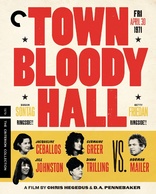
Price
List price:Amazon: $32.28 (Save 19%)
Third party: $32.28 (Save 19%)
Only 16 left in stock (more on the way).
Movie rating
6.5 | / 10 |
Blu-ray rating
| Users | 0.0 | |
| Reviewer | 4.0 | |
| Overall | 4.0 |
Overview
Town Bloody Hall (1979)
Filmmakers D.A. Pennebaker and Chris Hegedus document a debate between Norman Mailer and four feminists.
Starring: Norman MailerDirector: D.A. Pennebaker, Chris Hegedus
| Documentary | 100% |
Specifications
Video
Video codec: MPEG-4 AVC
Video resolution: 1080p
Aspect ratio: 1.33:1
Original aspect ratio: 1.33:1
Audio
English: LPCM Mono (48kHz, 24-bit)
Subtitles
English SDH
Discs
Blu-ray Disc
Single disc (1 BD)
Playback
Region A (locked)
Review
Rating summary
| Movie | 4.0 | |
| Video | 4.0 | |
| Audio | 4.0 | |
| Extras | 2.5 | |
| Overall | 4.0 |
Town Bloody Hall Blu-ray Movie Review
Reviewed by Jeffrey Kauffman September 24, 2020See if any part of this scenario sounds familiar: a person who is a member of a certain group stands up before an assembled multitude and begins advocating for equal treatment for that group, insisting that the group has been downtrodden and discriminated against for too long, and that the group’s lives matter, at which point an absolutely irate member of the audience throws an abrupt conniption fit, jumping up and screaming that all lives matter, before leaving the room in an angry huff. No, this has absolutely nothing to do with the so-called BLM movement and some of the responses it has engendered, it is instead a nearly verbatim exchange that takes place within seconds of the panel discussion about the then nascent women's liberation movement which is at the heart of Town Bloody Hall getting underway. In other words, the more things change, the more they stay the same, and anyone who feels they’ve been buffeted by too much angry discourse about things like “race relations” should perhaps put viewing this 1971 piece by D.A. Pennebaker and Chris Hegedus on hold for at least a little while, especially if they’re sensitive to issues surrounding gender roles and even gender identification. For anyone able to make it through the maelstrom, however, Town Bloody Hall is an absolutely fascinating trip through relatively recent history, a history which obviously still is refracting through “current events”, especially with the recent death of Ruth Bader Ginsburg and the already vehement debate about what might happen to things like abortion rights as a result (abortion rights perhaps unsurprisingly are overtly mentioned by some of the participants in this piece, in what was then a “pre-Roe” era).
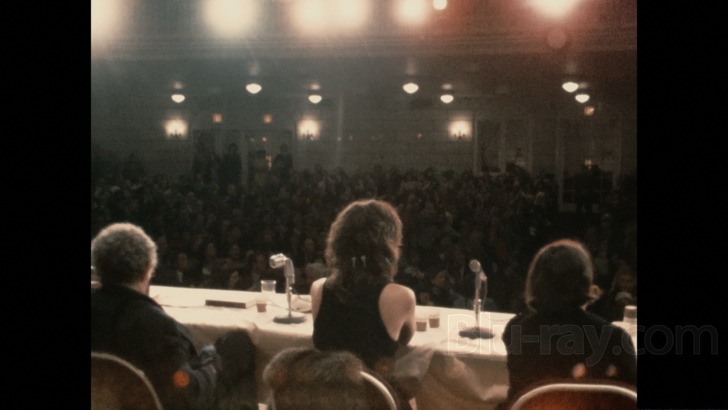
It’s perhaps salient to note that the “debate” in Town Bloody Hall took place in April of 1971, two years (give or take) before such epochal events as the Roe v. Wade decision by the Supreme Court, and arguably somewhat less epochal events that still captured the era’s zeitgeist, like the 1973 tennis match between Billie Jean King and Bobby Riggs that became fodder for its own feature film, Battle of the Sexes. The sparking incident for this event was an infamous article by Norman Mailer called The Prisoner of Sex which appeared in Harper’s Magazine, which was itself a response to critiques of Mailer’s work (along with several other writers) by Kate Millett. While Mailer mentions that The Prisoner of Sex perhaps unintentionally led to the demise of Harper’s, what actually happened was a mass resignation by the editorial staff which temporarily disrupted the publication but which did not actually “kill” it (the magazine is still around and still creating controversy, as its relatively recent A Letter on Justice and Open Debate, a piece kind of ironically criticizing “cancel culture”, proves).
Town Bloody Hall is an absolutely riveting historical document in both expected and unexpected ways. The "dialectic" between Norman Mailer, Germaine Greer, Jacqueline Cabellos, Jill Johnston and Diana Trilling is a little forced at times, with each of the women speaking, and then Mailer posing a question thereafter (which he insists they need to think about for a while before answering, in a "technique" that probably raised some feminine hackles in the day and may continue to for contemporary viewers). But the speeches by the women are absolutely fascinating, reflecting both the tenor of the times but also refracting into our own era with sometimes almost frightening perspicacity (as evidenced by the showdown over "all lives" that virtually opens the debate). Some of the ideas fostered, as in a comment by NOW President Cabellas that women should have "marriage insurance" to cover any expenses should they get divorced, seem to have fallen by the wayside (at least from my personal experience), but the underlying inequalities in career opportunities that Greer in particular brings up are obviously still very much au courant. (In this regard, it's interesting that nothing is really made of the fact that Mailer was one of the co-founders of The Village Voice, which was Johnston's employer at the time.)
Town Bloody Hall probably has the potential to alienate and in fact maybe even outright anger those on both sides of the so-called "women's liberation" divide. Those who are opposed to any form of feminism will probably find a lot of the discussion here "same old, same old" (this perhaps ironically despite the fact that it stems from 1971). On the other hand, those who either consider themselves feminists or at least sympathetic to the cause may be frustrated at realizing how little has really changed since this "bloody" event took place.
Town Bloody Hall Blu-ray Movie, Video Quality 
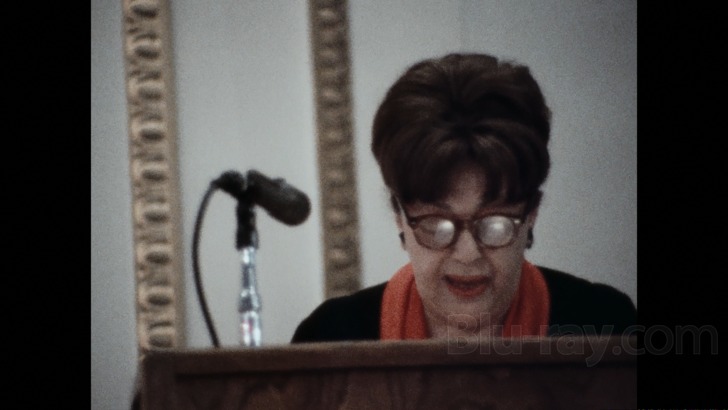
Town Bloody Hall is presented on Blu-ray courtesy of The Criterion Collection with an AVC encoded 1080p transfer in 1.33:1. In lieu of an insert booklet, Criterion provides a foldout sheet that reproduces the poster and also has an essay by Melissa Anderson and other information. This insert contains the following verbiage on the transfer:
Town Bloody Hall is presented in its original aspect ratio of 1.33:1. On widescreen televisions, black bars will appear on the left and right of the image to maintain the proper screen format. This new digital transfer was created in 4K resolution on a Scanity film scanner from the 16 mm A/B reversal. Thousands of instances of dirt, debris, scratches, splices and warps were manually removed using MTI Film's DRS, while Digital Vision's Phoenix was used for jitter, flicker, small dirt, grain and noise management.With an understanding that the source elements utilized for this transfer have some inherent limitations, this is an organic looking presentation, though one that has some obvious deficits in fine detail levels quite a bit of the time. One of the things exacerbating the perception of this transfer is the fairly unstable hand held camera work, where the frame can bounce around and focus pulling can be variable. There are also some obvious differences in clarity and grain structure, even from what are essentially the same perspectives (contrast screenshot 4 with screenshot 17 for an example, though there are others scattered throughout the rest of the screenshots). Colors look a little skewed toward browns, but certain pops of color, as in some of the apparel on display, resonate decently well. Despite the "grain and noise management" alluded to above, grain can occasionally look a bit on the noisy side, something that's especially apparent in some of the most dimly lit material.
The monaural soundtrack was remastered from the original 16 mm magnetic tracks using Avid's Pro Tools and iZotope RX.
Town Bloody Hall Blu-ray Movie, Audio Quality 
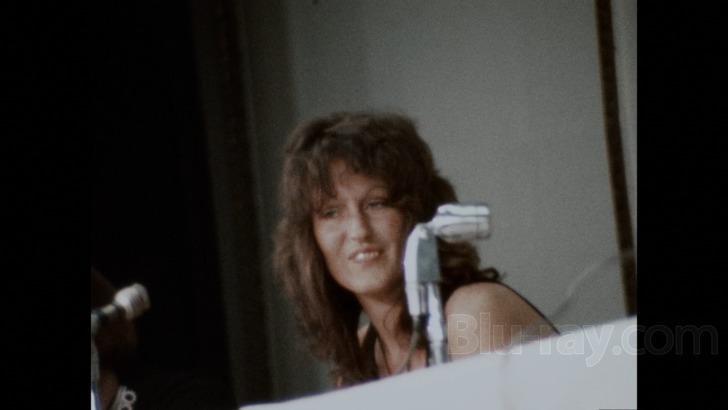
Town Bloody Hall features an LPCM Mono track that delivers most of the evening's events without any serious issues. There are isolated moments here, though, where either someone in the audience erupts in fury (it happens more than once, unbelievably) or people on the panel talk over each other, and it's not possible to clearly make out everything that's been said (or yelled, as the case may be). All of the "lectern" material sounds fine, and Mailer's asides from his table are typically well rendered as well. Optional English subtitles are available.
Town Bloody Hall Blu-ray Movie, Special Features and Extras 
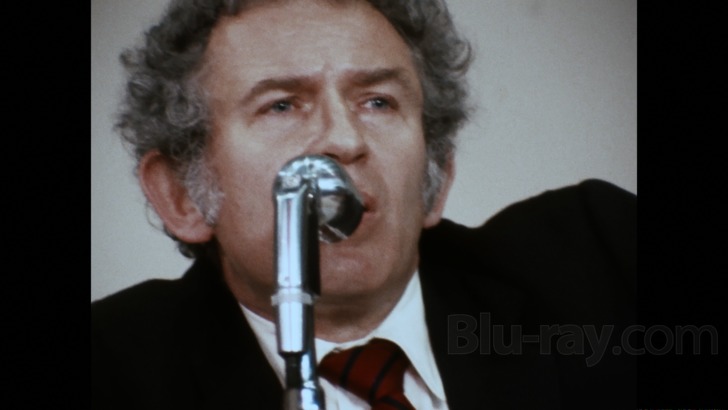
- Commentary is from 2004 and features Germaine Greer and Chris Hegedus.
- Chris Hegedus (1080p; 25:02) is a really interesting 2020 interview with Hegedus, who gives some general biographical information as well as detailing her long partnership with D.A. Pennebaker.
- Reunion (1080i; 22:23) is a fun piece from 2004 with Germaine Greer, Jacqueline Ceballos, and Jill Johnston.
- Greer and Mailer offers separate interviews with the two where they discuss the Town Hall and Pennebaker's involvement.
- Greer (1080p; 12:39)
- Mailer (1080p; 13:44)
- Norman Mailer on The Dick Cavett Show (1080i; 1:07:51) is a pretty amazing archival piece from 1971, with Mailer, along with Gore Vidal and Janet Flanner, making the usually glib Cavett speechless with their back and forth (Mailer and Vidal were in the midst of a feud).
Town Bloody Hall Blu-ray Movie, Overall Score and Recommendation 
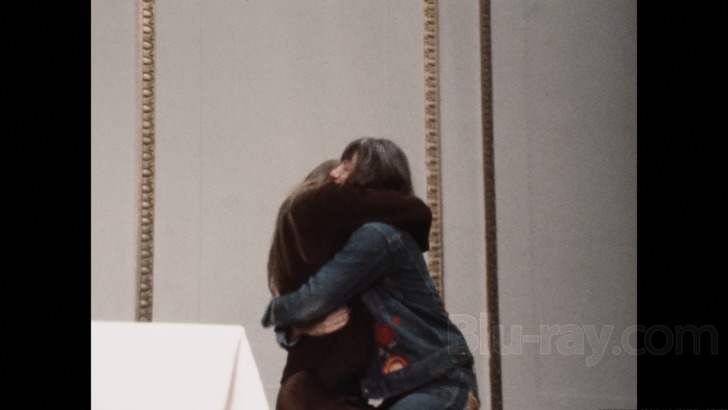
If you think a panel discussion from 1971 revolving around women's liberation has nothing to say to contemporary audiences, prepare to be disabused of that notion within about thirty seconds of this thing starting. I can actually see this piece making people very angry for resolutely different reasons, and maybe that speaks to its enduring power. Video has some built in limitations which can be discerned at least in part by perusing the screenshots accompanying this review. Audio is generally fine, and the supplementary package very interesting. Recommended.
Similar titles
Similar titles you might also like

The Inland Sea
1991

Nanook of the North
1922

Beauty Day
2011

Salesman
1968

Scala!!!
Or, The Incredibly Strange Rise And Fall Of The World's Wildest Cinema And How It Influenced A Mixed-up Generation Of Weirdos And Misfits
2023

Let Me Die a Woman
1977

Faya Dayi
2021

Forbidden Love
Slipcover in Original Pressing
1992

Bloody Nose, Empty Pockets
Standard Edition
2020

The Look of Silence
2014

Dick Johnson Is Dead
2020

The Creeping Garden
Limited Edition
2014

Consenting Adults: A Study of Homosexuality
1967

Helicopter Canada
1966

Clapboard Jungle
2020

Hangs Upon Nothing
2014

Mur Murs
Mural Murals
1981

Wheel of Time
2003

I Think We're Alone Now
Slipcover in Original Pressing
2008

Heart of a Dog
2015